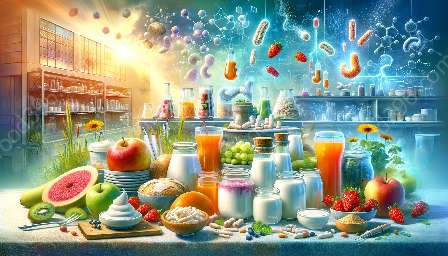Probiotics and prebiotics play a crucial role in animal health and are widely used as feed additives. These beneficial microorganisms have been the subject of extensive research, particularly in the context of animal nutrition and food safety. This article will explore the impact of probiotics and prebiotics on animal health and their relationship to food and drink.
The Role of Probiotics and Prebiotics in Animal Health
Probiotics are live microorganisms that, when administrated in adequate amounts, confer a health benefit on the host. In animals, probiotics can help maintain a healthy gut microbiota, improve digestion, and enhance immune function. Prebiotics, on the other hand, are non-digestible dietary fibers that promote the growth and activity of beneficial bacteria in the gut. Both probiotics and prebiotics are essential for maintaining gut health in animals, which in turn contributes to overall well-being and performance.
Feed Additives and Nutritional Benefits
Probiotics and prebiotics are commonly included in animal feed as additives to enhance nutritional value. These supplements can improve feed efficiency, promote animal growth, and reduce the need for antibiotics. In addition, they have been shown to mitigate the negative effects of stress on livestock and improve resistance to diseases. The use of probiotics and prebiotics as feed additives aligns with the growing demand for sustainable and natural solutions in animal husbandry and production.
Study of Probiotics and Prebiotics
The study of probiotics and prebiotics in animal health encompasses various disciplines, including microbiology, immunology, and nutrition. Researchers are continuously investigating the mechanisms by which these beneficial microorganisms influence gut microbial populations, immune responses, and nutrient absorption in animals. Moreover, studies focus on identifying specific strains of probiotics and prebiotics that offer the greatest health benefits to different species of animals. The scientific understanding of probiotics and prebiotics continues to evolve, providing valuable insights into their role in animal health and nutrition.
Food and Drink Implications
The use of probiotics and prebiotics in animal feed has implications for the food and drink industry. Consumers are increasingly seeking products derived from animals that have been raised with minimal antibiotic use and have received natural, health-promoting supplements. As a result, there is a growing market for food and beverage products that are labeled as being sourced from animals fed with probiotics and prebiotics. This trend reflects a broader interest in sustainable and ethical animal agriculture practices, as well as a desire for foods that support gut health and overall well-being.
Conclusion
Probiotics and prebiotics are integral to animal health and play a vital role in the production of high-quality animal products. As our understanding of these beneficial microorganisms continues to expand, so does their application in animal nutrition. The relationship between probiotics, prebiotics, and animal health intersects with the broader conversations about food and drink, sustainability, and consumer preferences. By embracing the potential of probiotics and prebiotics in animal feed, we can enhance animal welfare, food safety, and the nutritional value of animal-derived products.

